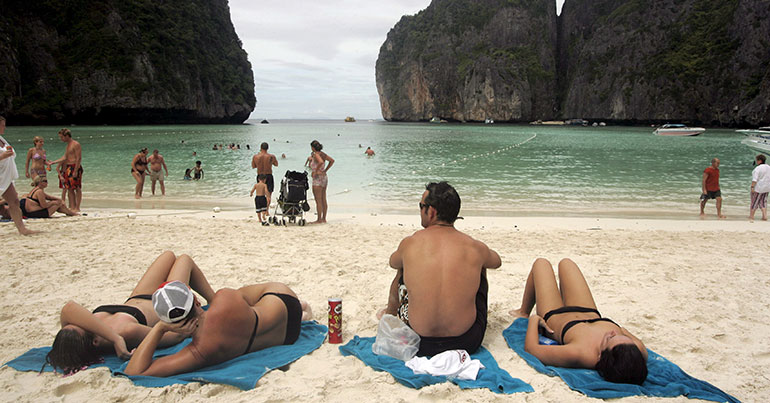A Thai beach made famous by the 2000 film The Beach starring Leonardo DiCaprio will now be closed annually to tourists for four months of the year as authorities attempt to prevent further environmental damage

Maya Bay, on Phi Phi Leh Island, will be closed off between June and September in a bid to tackle growing environmental issues, with recent surveys by marine biologists saying much of the coral reef surrounding the island has gone and sea life has all but disappeared, AP reported.
The bay, known for its pristine white sand and beautiful scenery, welcomes around 4,000 tourists and 200 boats per day.
Phi Phi Leh Island shot to fame in the 2000s after Alex Garland’s 1996 novel The Beach was adapted for the big screen. Set on the island, it tells the story of a young backpacker and his search for an idyllic, unspoiled beach. Since the film’s release Maya Bay has remained open year-round, unlike many Thai beaches which close temporarily during the year to limit environmental damage.
“It’s like someone who has been working for decades and has never stopped,” Thon Thamrongnawasawat, a prominent marine scientist, told AP. “Overworked and tired, all the beauty of the beach is gone. We need a timeout for the beach.”
It is not the first time Thai authorities have stepped in to tackle environmental issues brought on by a rising influx of tourists. In 2016 Koh Tachai Island was closed for an indefinite period to allow for the rehabilitation of the beach and the surrounding water.
The problem is not only restricted to Thailand. This week Philippine President Rodrigo Duterte announced that the country’s world-famous tourist hotspot Boracay Island will close for at least six months. In a speech last month Duterte labelled it a “cesspool” due to the overwhelming environmental issues affecting the island.
Tourism is one of the fastest growing industries in the world, contributing $7.6 trillion to the global economy in 2016 and supporting 292 million jobs. This was the equivalent of 10.2% of the world’s GDP, and approximately one in ten of all jobs, according to a report by the World Travel and Tourism Council.
Thailand itself is one of the world’s most popular tourist destinations. The number of visitors is expected to rise to 60 million per year by 2030, the Financial Times reported. This is in part due to a growing number of Chinese tourists, who by 2021 are predicted to spend $429 billion on foreign trips, with Thailand one of their top destinations, according to a report by CLSA.
When Maya Bay reopens Thai authorities say there will be a daily limit of 2,000 visitors, and boats will have to anchor on the other side of the bay.
Thamrongnawasawat believes the temporary closure is a step in the right direction. “This would be a good way to start managing our tourist destinations. And we can improve on what we learn after the first year,” he told AP.
“We know that it’s important we manage our resources well. It’s not about more numbers of tourists but about sustainable tourism that benefit locals as well,” he said.
Related reading:
- Major health and environment impacts as unwanted gadgets pile up
- Cambodian forest activist wins top environmental prize
- Indonesia to become first Asian country to issue green bonds

